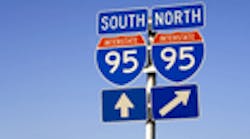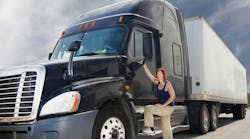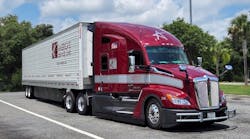A transportation-appropriations bill passed yesterday by the U.S. Senate permanently exempts Maine and Vermont from the federal 80,000-lb. weight limit on the Interstate highways that cross the two northern New England states.
Part of an omnibus 2012 funding bill covering the operation of the Depts. of Agriculture, Commerce, Justice and Transportation, the legislation passed easily (69-30). The bill next goes to conference between the Senate and House before final passage.
But the Maine and Vermont truck-weight exemption does not exist in the House version of the bill, according to The Portland Press Herald. However, the newspaper’s online report stated that Sen. Susan Collins (R-ME) - who authored the truck-weight provision and who is senior Republican on the Senate Transportation Appropriations Subcommittee - will be part of the conference committee that will reconcile the different House and Senate omnibus bills.
“Congressional leaders hope the Senate and House can reconcile the differing versions before Nov. 18, when a temporary 2012 spending measure expires,” noted the Herald.
Getting the higher truck-weight limit on Interstates ( I-89, I-91, I-95, I-195, I-295 and I-395) that traverse Maine and Vermont has long been viewed as critically important by political and business leaders of both states for two reasons: To move heavier trucks off local rural roads for safety’s sake and to make a more level playing field for Maine and Vermont trucking operations with truckers operating in other nearby states and provinces that already may allow heavier trucks on their respective Interstates and highways.
“This is a major step forward in my effort to allow the heaviest trucks to drive on our federal interstates for once and for all,” said Sen. Collins in a statement. “This has always been one of my top transportation priorities. It would help shippers, truckers, and Maine’s job creators. Most important, it would help Mainers who live, work, and go to school along the secondary roads where these trucks are currently forced to travel. Safety is, and has always been, my top concern.
“My provision would not increase the size or weight of trucks,” she continued. “Maine law already allows trucks weighing up to 100,000 lbs. to operate on state and municipal roads. But these same trucks are not allowed on the Interstates, where it is safer for them to travel.”
Currently, heavier trucks are permitted on many Interstates in New Hampshire, Massachusetts and New York State as well as on similar highways in the neighboring Canadian provinces of New Brunswick and Quebec.
And the heavier trucks had been allowed in Maine under a one-year pilot program that ended at the end of last year. That pilot had been hailed a success by both the Maine Dept. of Transportation and the Maine Motor Transport Assn. (MMTA).
Collins’ provision for raising the weight limit for Maine was paired in the omnibus bill with a similar change for Vermont, which was authored by Sen. Patrick Leahy (D-VT), who is also a member of the Transportation Subcommittee and “has worked closely with Sen. Collins on this issue,” said Collins’ office.
According to Leahy’s office, “The House is several steps behind the Senate in acting on their counterpart bill…The House bill goes next to the full Appropriations Committee and then to the House floor. At some point, once the Senate and House have approved their separate bills, the differences will be ironed out in either a formal or informal House-Senate conference among the appropriators.”




